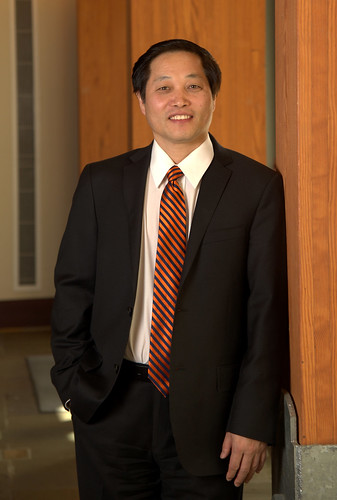Auburn professor named Carnegie Fellow to study how Asia can feed its citizens without detrimental effects on the environment
Article body
Auburn University Professor Hanqin Tian has been named a 2019 Andrew Carnegie Fellow and will receive $200,000 to support his research on how Asia, home to more than half of the world's population, can provide enough food for its citizens without detrimental effects on the environment.
Tian was one of 32 fellows selected from nearly 300 nominees by the Carnegie Corporation of New York to be awarded grant money for high-caliber research that “addresses pressing issues and cultural transitions affecting us at home and abroad.”
As a Carnegie Fellow, Tian will develop solutions to the projected reduction of cultivable land in Asia and study the impact climate change will have on the region’s food production. Increasingly frequent extremes in climate, dwindling available agricultural land and inefficient resource use have made the food supply less productive and costlier.
“Hanqin stands to make a tremendous impact on one of the greatest challenges facing our society: meeting the food demands of a growing global population in a sustainable way,” said Auburn University President Steven Leath.
As the Solon and Martha Dixon Endowed Professor and director of the International Center for Climate and Global Change Research in the School of Forestry and Wildlife Sciences, Tian’s scholarly work focuses on coupled human-earth system dynamics and bridging natural science, economics and social science inquiry with researches across the globe to identify solutions to many of the world's most pressing environmental challenges.
"This is a great honor for our Auburn Family," said Tian. “It’s one of many outstanding testaments of national and global recognition for Auburn’s research. I am deeply humbled and very grateful to be selected by the jury as an Andrew Carnegie Fellow and to join past recipients who I have long admired and respected. The Carnegie’s fellowship provides me with an excellent opportunity to understand how growing population, urbanization and global climate change will affect human well-being and sustainable development, the greatest challenge facing the society and humanity in the 21st century."
The leader of Auburn’s Climate-Human-Earth System Sciences, or CHESS, cluster, Tian’s research has been featured in about 300 publications, including six of them in the journals Science and Nature. Since 2016, Tian has published papers in Nature every year on the cutting-age research of global climate change and sustainable development. His 2016 Nature paper revealed one remarkable discovery surrounding the net balance of the three major greenhouse gases—carbon dioxide, methane and nitrous oxide—for every region of Earth's landmasses. His groundbreaking work revealed that human-induced emissions of methane and nitrous oxide from ecosystems overwhelmingly surpass the ability of the land to soak up carbon dioxide emissions, contributing to climate change.
“Hanqin is an exceptional scholar, and as a Carnegie Fellow, he has the potential to determine the implications of global trade on food supply and how technology can be better leveraged to alleviate the impact the food trade has on the environment,” said Leath.
For more than a century, the Carnegie Corporation of New York has made significant advancements to the promotion of international peace, education and knowledge. The 2019 program provides fellowships of $200,000 to selected scholars, journalists and public intellectuals across four broad topic areas that include strengthening U.S. democracy and exploring new narratives, technological and cultural creativity, global connections and global ruptures and natural and human environments.
(Written by Julie Huff, Auburn University)
Related Media
Media interested in this story can contact Communications Director Preston Sparks at (334) 844-9999 or preston.sparks@auburn.edu.
Auburn University is a nationally ranked land grant institution recognized for its commitment to world-class scholarship, interdisciplinary research with an elite, top-tier Carnegie R1 classification, life-changing outreach with Carnegie’s Community Engagement designation and an undergraduate education experience second to none. Auburn is home to more than 30,000 students, and its faculty and research partners collaborate to develop and deliver meaningful scholarship, science and technology-based advancements that meet pressing regional, national and global needs. Auburn’s commitment to active student engagement, professional success and public/private partnership drives a growing reputation for outreach and extension that delivers broad economic, health and societal impact.





